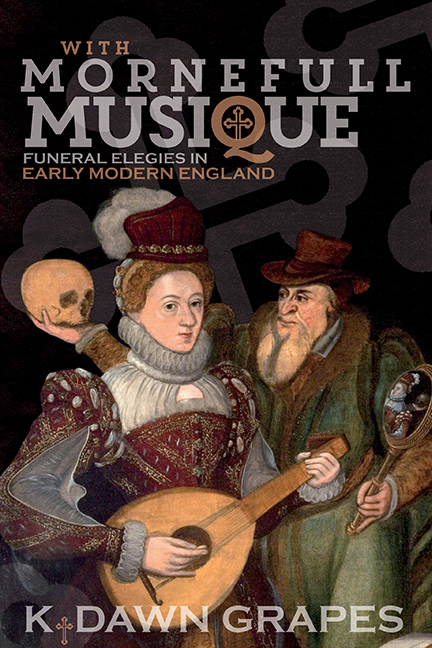 With Mornefull Musique: Funeral Elegies in Early Modern England
With Mornefull Musique: Funeral Elegies in Early Modern England WHEN in 1588 William Byrd printed his funeral songs for Sir Philip Sidney at the end of Psalmes, Sonets, & songs, he could not have known that he was at the fore of an ongoing tradition honoring respected English citizens after death through song. As with so much surviving music of the Elizabethan, Jacobean, and early-Carolinian eras, commemorative consort songs, lute songs, madrigals, and mixed consort pieces reflect an elite musical tradition, one predicated on a musical literacy that was promoted within the uppermost classes of society. Dissemination of these musical tributes through printed collections and personal manuscripts assured their presence in communities that could both afford and appreciate the gesture. It is, therefore, unsurprising that the subjects of commemorative pieces were those who mingled within aristocratic circles. The use of these songs to solicit patronage and to spread propagandous images, while maintaining heartfelt sentiment, and the ability to place them individually within disparate types of musical collections made them especially valuable. A close examination of the individuals associated with the inspiration for, creation, and dissemination of early English musical elegies further illuminates the very complex hierarchical structures of early English society, even within its most exclusive top quadrant. That there are no records of these specific songs being sung in any given situation lends credence to their function as a musical memorial, a physical and aural inscription to be passed on to succeeding generations.
Musical funeral elegies were written by many of the most respected composers of the era, and yet these commemorative songs are often not the most well-known or well-regarded compositions of the period. They have not sustained their importance over time, perhaps because of a textual focus on one specific person, their short length, or placement within volumes made up of pieces of distinctly different music. Still, in many ways they remain the most human compositions of the era. In today's modern society, early English musical funeral elegies serve as a reminder that those who came before us are not so different than we are now, some four hundred years later. Those individuals who lived so long ago also had hopes and dreams, grappled with political and religious conflicts, struggled to find purpose and legacy, and were mourned by the family and friends they left behind.
To save this book to your Kindle, first ensure no-reply@cambridge.org is added to your Approved Personal Document E-mail List under your Personal Document Settings on the Manage Your Content and Devices page of your Amazon account. Then enter the ‘name’ part of your Kindle email address below. Find out more about saving to your Kindle.
Note you can select to save to either the @free.kindle.com or @kindle.com variations. ‘@free.kindle.com’ emails are free but can only be saved to your device when it is connected to wi-fi. ‘@kindle.com’ emails can be delivered even when you are not connected to wi-fi, but note that service fees apply.
Find out more about the Kindle Personal Document Service.
To save content items to your account, please confirm that you agree to abide by our usage policies. If this is the first time you use this feature, you will be asked to authorise Cambridge Core to connect with your account. Find out more about saving content to Dropbox.
To save content items to your account, please confirm that you agree to abide by our usage policies. If this is the first time you use this feature, you will be asked to authorise Cambridge Core to connect with your account. Find out more about saving content to Google Drive.